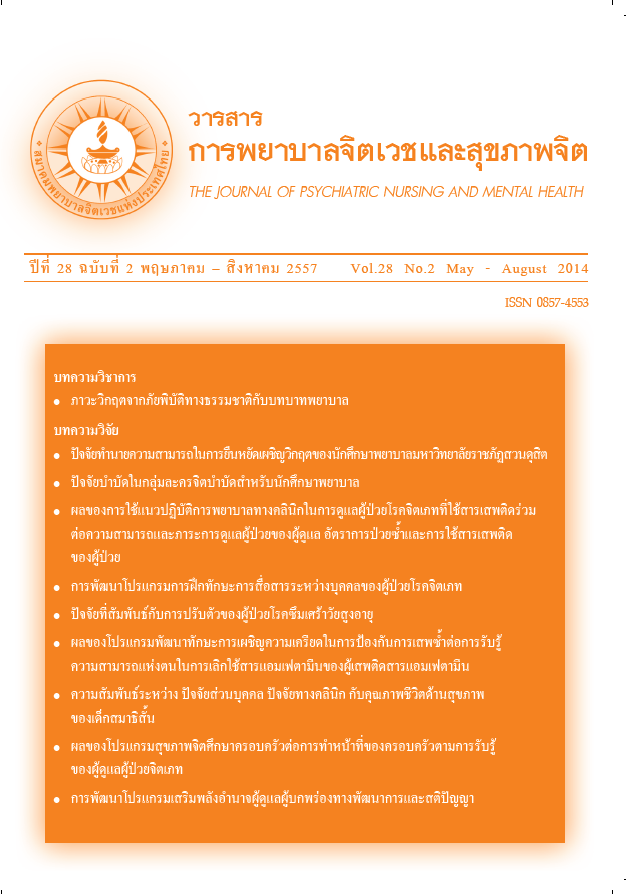การพัฒนาโปรแกรมเสริมพลังอำนาจผู้ดูแลผู้บกพร่องทางพัฒนาการและสติปัญญา
Main Article Content
บทคัดย่อ
วัตถุประสงค์: เพื่อพัฒนาโปรแกรมเสริมพลังอำนาจของผู้ดูแลผู้บกพร่องทางพัฒนาการและสติปัญญาและศึกษาผลของโปรแกรม
วิธีการศึกษา: การวิจัยแบบกึ่งทดลองครั้งนี้ กลุ่มตัวอย่างคือ ผู้ดูแลผู้บกพร่องทางพัฒนาการและสติปัญญา จำนวน 60 คน คัดเลือกแบบเฉพาะเจาะจง โดยแบ่งเป็นกลุ่มทดลอง จำนวน 30 คน และกลุ่มควบคุม จำนวน 30 คน เครื่องมือวิจัย ประกอบด้วยโปรแกรมเสริมสร้างพลังอำนาจผู้ดูแลผู้บกพร่องทางพัฒนาการและสติปัญญาที่ผู้วิจัยสร้างขึ้น แบบประเมินพลังอำนาจของผู้ดูแลผู้บกพร่องทางพัฒนาการและสติปัญญา และแบบประเมินพฤติกรรมการดูแลของผู้ดูแล วิเคราะห์ข้อมูลโดยการหาค่าความถี่ ร้อยละ ส่วนเบี่ยงเบนมาตรฐาน และสถิติ t-test
ผลการศึกษา: ผลการศึกษาที่สำคัญมีดังนี้ 1. โปรแกรมเสริมพลังอำนาจผู้ดูแลผู้บกพร่องทางพัฒนาการและสติปัญญามีค่าความตรงตามเนื้อหา .93 เนื้อหาโปรแกรมประกอบด้วยการค้นพบสภาพจริง การสะท้อนคิดอย่างมีวิจารณญาณ การจัดการกับสถานการณ์ และการคงไว้ซึ่งพลังอำนาจ 2. หลังการเข้าร่วมโปรแกรม และหลังเข้าร่วมโปรแกรม 1 เดือน ผู้ดูแลในกลุ่มทดลองมีค่าเฉลี่ยของพฤติกรรมการดูแลมากกว่าก่อนได้รับโปรแกรม และสูงกว่ากลุ่มควบคุมอย่างมีนัยสำคัญทางสถิติที่ระดับ .05
สรุป: โปรแกรมเสริมสร้างพลังอำนาจสามารถเพิ่มพฤติกรรมการดูแลของผู้ดูแลผู้บกพร่องทางพัฒนาการและสติปัญญา การที่ผู้ดูแลมีพฤติกรรมการดูแลที่เพิ่มขึ้นจะช่วยส่งเสริมการดูแลผู้บกพร่องทางพัฒนาการและสติปัญญาให้มีประสิทธิภาพต่อไป
Objectives: To develop the empowerment program for caregivers of persons with develop-mental and intellectual disabilities and examine the effects of the program.
Methods: The research design was a quasi-experimental research. Sixty caregivers of persons with developmental and intellectual disabilities were purposively selected and divided into experimental and control group, 30 caregivers in each group. The experimental group received the empowerment program for caregivers, while the control group received the routine care. The research instruments consisted of the empowerment program for caregivers developed by the researchers, the empowerment assessment scale, and the caring behaviors of caregiver scale. Data were analyzed using frequency, percentage, standard deviation, and t-test.
Results: Major findings were as follows: 1. The index of Item-Objective Congruence of the program was .93. The content of the program included discovering reality, critical reflection, taking charge, and holding on. 2. After the program and at one month after the program, the experimental group had mean score of caring behaviors statistically higher than before receiving the program and higher than those in the control group (p < .05).
Conclusion: The empowerment program can increase caring behaviors in caregivers of persons with developmental and intellectual disabilities. The caregivers with higher caring behaviors will enhance the care of persons with developmental and intellectual disabilities.
Article Details
บทความที่ได้รับการตีพิมพ์แล้ว เป็นลิขสิทธิ์ของสมาคมพยาบาลจิตเวชแห่งประเทศไทย


